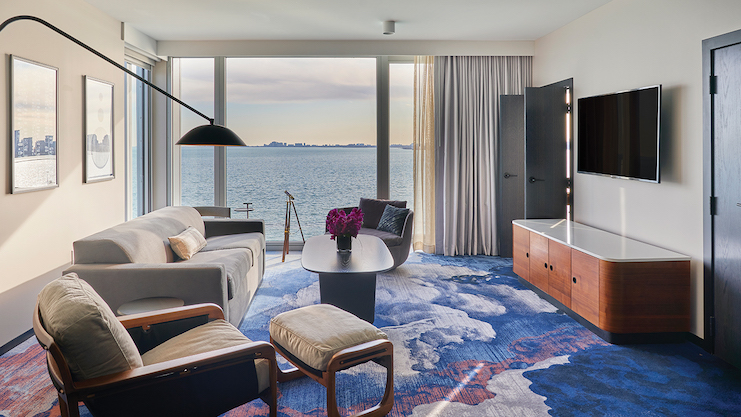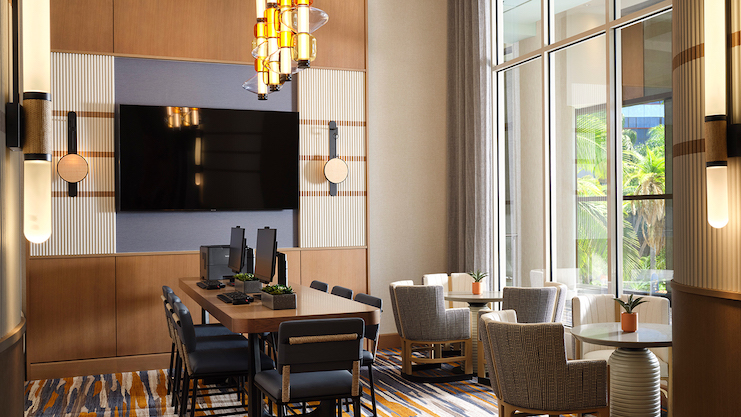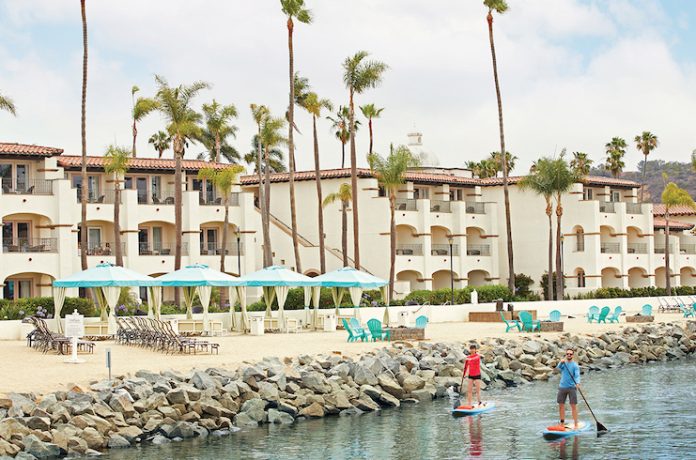The portmanteau “bleisure”—a mashup of “business” and “leisure”—denotes a phenomenon for our time, a time when technology makes it possible to work, even long-term, from locations that can be explored for pleasure when off the clock, often with partners and families. Seven hotel executives recently described for LODGING the emergence and evolution of bleisure, and how their respective properties are making the most of it:
- Matt Kiedrowski, director of revenue generation, Maverick Hotels and Restaurants, who is based at the Curio Collection by Hilton property Sable at Navy Pier
- Tim Plamondon, director of sales and marketing, The LaSalle Chicago, an Autograph Collection Hotel
- Dina Niekamp, AVP, sales, marketing & brand, Miraval Resorts & Spas
- Scott Ostrander, general manager, Kona Kai San Diego
- Tom Tabler, general manager, Marriott Marquis San Diego Marina
- Eric Jenkins, general manager, Estancia La Jolla Hotel & Spa
- Agnes Hayes, general manager, The Whitney Hotel, Boston
The comments of these hospitality insiders reflect the growing prevalence of bleisure travel and how and why hoteliers should seize the opportunities it presents.
Then and Now
As all sources noted, the concept of extending a business trip for a day or two, perhaps with a companion tagging along to enjoy a free room in a special location, is nothing new. True, the tech-enabled trend toward remote work, which has been gaining traction in recent years, helped workers be more productive when out of the office and even allowed many to work part time or full time from home, but the traditional office-based business model remained firmly entrenched.
Then came the worldwide pandemic, and nearly overnight, remote work went from being a flexible option enjoyed by some to a critical necessity for businesses struggling to survive amid prolonged government-mandated shutdowns.
What was learned during this difficult time—i.e., the feasibility of remote work—has had a powerful impact on the traditional work model. What has come as a surprise to many is the extent to which remote work seems here to stay, and how it has opened a whole new world of work and travel. As Tabler observed, “The flexibility offered by remote work has transformed business trips into opportunities for extended stays, allowing professionals to explore and enjoy destinations in a way that was less prevalent in the pre-pandemic era.”
This is good news for hotels with the ability to cater to bleisure travelers’ needs and desires. As Jenkins described it, leisure travelers generally want “a seamless blend of business-oriented amenities and leisure-focused offerings,” with “comfortable and well-equipped workspaces, high-speed Internet, meeting facilities, upscale recreational facilities, unique dining opportunities, and unique local experiences to enjoy during their leisure time.” However, it can be tricky balancing the business and leisure components, especially when there are also companions—sometimes very young ones—to consider. Niekamp, who is sometimes joined by her husband and young children when work takes her to a special location or property, stressed the difference between what she looks for with and without family. “When traveling solo, I don’t really care what type of accommodations I’m in; I don’t even look at my confirmation or hotel website. But when they join me, I need to know my husband can keep his daily routine with the kids so I can focus on work,” she explained. For this reason, she favors luxury hotels. “They are used to special requests, there is more willingness to go above and beyond,” she said, adding that family activities that she can join in the off hours are especially important.
In addition to family activity offerings, here are five differentiators for successful properties in the bleisure market:
Destination Appeal
Kiedrowski said that creating a destination for such travelers was “a key tactic” in building the 223-room Sable at Navy Pier. “We’re on a dock with three large boats in front of us, and an amusement park on top of us. There are restaurants, including our Offshore Rooftop with 360-degree views of the city, and in March, we’ll have FlyOver Chicago Navy Pier, with immersive technology to provide a simulated trip of Chicago,” he related.
Inviting F&B Venues
As Plamondon sees it, “Providing guests with luxury-tier food and beverage experiences that many hotels have done away with—like 24/7, full-service in-room dining—can differentiate a hotel from its neighbors and gives bleisure-travel ‘foodies’ a way to enjoy a truly high-quality meal from the comfort of their guestrooms.”
Kiedrowski added that on-property F&B can be welcome when bleisure travelers are attending to their work responsibilities. “They might not want to be stuck in their room or a meeting hall. They may want a place where they can set up a laptop but also enjoy food and beverage, perhaps outside by a pool or lake, to enjoy more of a leisure experience,” he explained.
Wellness Amenities
Plamondon tacked on a wellness program to the list of bleisure property must-haves, saying these travelers now expect “a wellness experience that not only mirrors, but goes beyond, what they have at home.” Toward this end, he said, The LaSalle Chicago offers complimentary yoga/meditation sessions on Wednesdays and Saturdays to capture both weekday and weekend guests. They also offer immersive “Sound Bath” sessions in their ballroom—in the spirit of the recently popularized ASMR experiences.
Kiedrowski mentioned fitness options at Sable Navy Pier that go beyond the standard gym travelers of all descriptions now expect. Among its wellness offerings is the “Wellness on the Water” fitness brunch, a partnership between Sable’s Rooftop Restaurant and Chicago fitness clubs like Equinox.
Office Pods
Kiedrowski cited an innovative workspace alternative to the typical business center with a couple of computers and a printer (that is often out of paper), which can be just the thing for the business traveler whose companions may want to sleep in or enjoy in-room entertainment. “The Sable is now experimenting with glass-enclosed soundproof pods that will enable single workers or groups to work privately, away from their rooms or the convention space,” he said. These pods come in different sizes and can be rented by the hour. They include phone booth-size pods for one as well some that can accommodate up to four people, with a webcam for conference calls.
Special Packages
As Jenkins pointed out, special packages that combine business and leisure perks can make a property stand out and incentivize travelers to extend their trips and/or include others. “Promotions targeting bleisure travelers and partnerships with local businesses further incentivize guests to explore beyond their work commitments,” he remarked. Among the special packages designed for the leisure part of bleisure travel at The LaSalle, said Plamondon, are its “VIP Foodie” and “Joy of Color” packages, which “provide guests with priority seating and access to Chicago’s most exclusive restaurants and its new Color Factory museum.”
While Hayes described work-friendly amenities like co-working spaces and business centers, she placed special emphasis on an array of packages geared toward experiences in The Whitney Hotel’s central Boston location. They include Beacon Hill Shopping, Museum of Science, and Boston in Love packages; the latter can be tailored to include a helicopter ride over Boston or a sunset cruise on the Charles River on a personal yacht. “We also craft experiences based on the guest’s interests, such as a food tour of the North End,” she added.
The Evolving Bleisure Experience
Tabler pointed out that what he termed “the fusion of self-care and a hybrid work-vacation” is “a concept that’s ever-changing,” challenging properties like his, the Marriott Marquis San Diego Marina, to keep up. “We continuously explore innovative ideas to enhance the bleisure experience, considering trends in remote work, technology, and guest preferences. Our commitment is to stay at the forefront of what’s ‘new and next’ to ensure that our offerings align with the dynamic nature of bleisure travel.”
The Ultimate Company Benefit: Bleisure Travel Opportunities Can Differentiate Employers
Scott Ostrander, general manager, Kona Kai San Diego, and Dina Niekamp, AVP, sales, marketing & brand, Miraval Resorts & Spas, pointed out that bleisure can be a powerful tool for recruitment and retention for companies that support it.
As Ostrander observed, bleisure is an attractive benefit for employees seeking a “workcation,” and can make all the difference to the employees they wish to attract and retain. “Travel well-being relates to job satisfaction, which can encourage traveling and remote employees to stay engaged, stay productive, and stay longer in their jobs,” he said.
Niekamp, who called the ability to bring along others “the ultimate company benefit,” agrees that it can be a game changer for companies that embrace it. “This is something all employers should encourage and all hotels and resorts should actively promote. Allowing for bleisure travel allows Americans to experience more out of life while still accomplishing the business travel we require for successful business production,” she explained. “Allowing for bleisure travel within your company offers unsung benefits that lead to loyalty and longevity within the company.”













